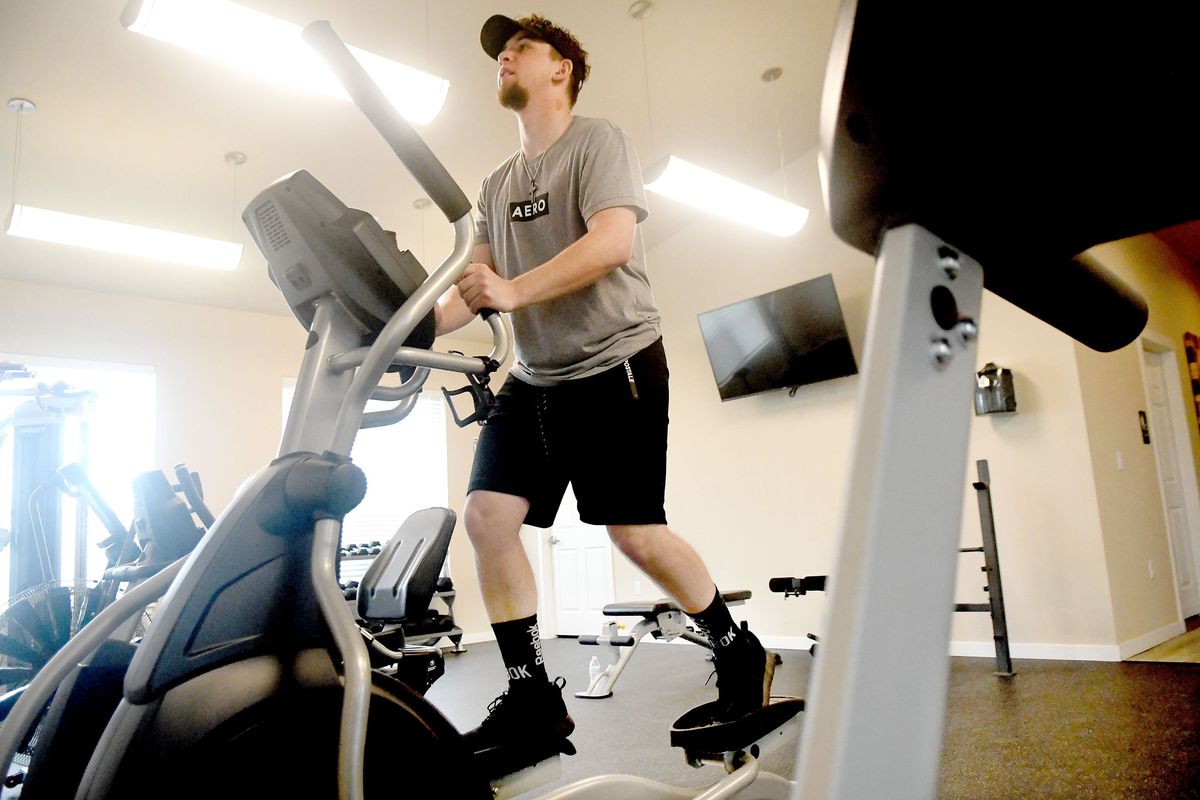‘I don’t know how I’m walking’: 20-year-old temporarily paralyzed by bullet still lodged in his spine pushes on to defy doctors’ predictions

Doctors told Steven LeBlanc he would never walk again after a bullet pierced his upper body, punctured his lung and settled near his spine. It remains there today.
They were right for one or two months. But then LeBlanc, now 20, started to gain feeling and movement in his lower extremities, and now he walks – albeit with a limp on some days.
LeBlanc met up with Logan Birrell, now 18, and Tobias Hamm, now 19, to sell the two teens a vape pen on Oct. 18, 2020, in the area of the 2700 block of East 55th Avenue on the South Hill. The trio talked briefly, then Birrell pulled out a black semi-automatic pistol and pointed it at LeBlanc, according to court documents.
Birrell demanded LeBlanc’s vehicle and money, but LeBlanc thought the firearm was fake. He told Birrell he would have to shoot him, then slapped at the pistol, documents said. LeBlanc eventually started pulling away in his car when he heard a gunshot, then felt pain in his upper body and lost feeling in his legs, according to documents.

LeBlanc said the bullet went through his car window and seat before hitting him.
With his foot stuck on the gas pedal, LeBlanc accelerated heading west on 55th, documents said. LeBlanc lifted his leg off the gas pedal and used the emergency brake to stop the car at 55th Avenue and Crestline Street, where he called 9-1-1.
LeBlanc said he couldn’t breathe or yell for help because the bullet struck his lung. Luckily, a bicyclist and a doctor nearby assisted him. He said he thought he was going to die but stayed calm.
“I was just so calm about it, which was so weird,” he said.
He said he was paralyzed from the belly button down for one or two months. The most difficult parts were watching his muscles deteriorate from inactivity and “thinking about running.”
LeBlanc was active and athletic prior to being shot.
He was a three-sport athlete at Rogers High School and worked construction and landscaping after high school. He said he liked getting football games together at Joe Albi Stadium after work, going to the gym and doing backflips off cliffs into the water.
“It’s hard acclimating from that to where I’m at,” he said.
LeBlanc said he was on a lot of pain medication the first couple weeks in the hospital, so he slept often. When he woke up, he didn’t think he would ever walk again.
But LeBlanc started to gain movement. It started in his right toe, then crept toward his right ankle and further up.
One day, doctors told him to think about kicking his right leg up while he was doing therapy on parallel bars.
“I was thinking and it shot up, and I started crying,” he said. “And they were like, ‘You’re going to walk again.’ ”
While he had renewed hope to walk, LeBlanc said he spent six to eight months at Providence Sacred Heart and Providence St. Luke’s Rehabilitation medical centers. During that time, his visitors were limited because of the COVID-19 pandemic.
He could see one visitor at a time, he said, and could not have anyone in his room at certain times.
“I wouldn’t watch TV,” he said. “I would just sit there and pray and look at the wall.”
LeBlanc said he now works out a few times a week. He hops on the elliptical at his apartment’s gym for about three minutes before he gets uncomfortable and gets off the machine. His left leg is weaker and shakes at times when exercising.
Then, he does upper body workouts including dumbbell curls, shoulder presses, pull-ups and dips. But, working out and walking remain risky, as a fall could lead to paralysis again, which is scary, he said.
LeBlanc said he takes Bruno, his American Bulldog and pit bull mix, to the dog park and walks with his girlfriend. He gets bored with his daily routine, but he also finds enjoyment in the little things, like getting up in the morning and grabbing the remote.
He said he endures nerve pain, which sometimes is extreme, and back pain every day. The mental pain is there, too, as sometimes he wakes up in the middle of the night with flashbacks of being shot.
LeBlanc said he believes he will walk normally again, but he’s unsure if the bullet will be removed.
“I don’t know how I’m walking,” said LeBlanc, adding that doctors are already shocked at his progress.
LeBlanc said he wanted to flip houses as a career before the nearly fatal incident, but now he can’t. While his main objective is to continue to recover, he said he is trying to find a career he enjoys. He said he is not the type of guy who wants to sit at a desk.
LeBlanc said the bullet wound has been an unexpected blessing. The experience has made him a better person.
“I wish it could not happen, but I wouldn’t be the man I am today without it,” he said.
Meanwhile, LeBlanc said he has forgiven Birrell and Hamm.
Birrell was sentenced to eight years in prison last month for first-degree robbery, second-degree assault with a firearm enhancement and conspiracy to commit first-degree robbery. Hamm was sentenced in December to seven years in prison for conspiracy to commit first-degree robbery, first-degree robbery, criminal mischief and money laundering.
“God says to always forgive,” LeBlanc said.
He said he recognized at last month’s sentencing that Birrell was remorseful, and that his family cared. Birrell’s parents said at the sentencing that they hope LeBlanc continues to progress in his recovery.
Birrell’s family, including his parents, hugged LeBlanc after Birrell was sentenced. LeBlanc said the support from the Birrell family surprised him.
“Having that closure was really nice,” he said.